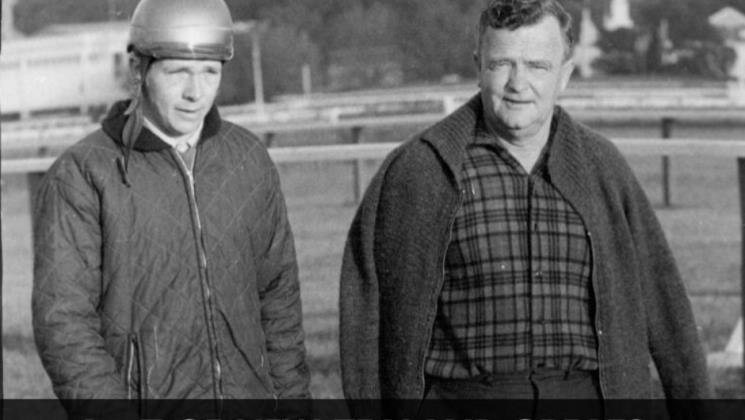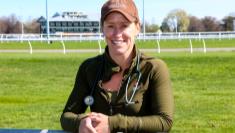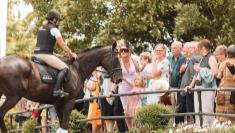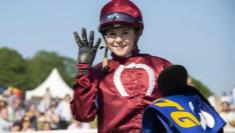
A - Z New Zealand greats - Eric Temperton
Eric Temperton was a jack of all trades and master of most.
There was little the affable but low-key Awapuni horseman failed to achieve in a lengthy training career.
Temperton, who trained his last winner in the 1986-87 season, was the first central districts trainer to win 1000 races in New Zealand, won two New Zealand training premierships and was runner-up three times.
He won the 1971 Melbourne Cup and ran second – with another horse – the following year and had placings in the Caulfield Cup and Cox Plate. His roll of honour also included the New Zealand Derby, NZ Oaks, Wellington Cup, New Zealand Cup, NZ St Leger, Great Northern Oaks, Manawatu Sires’ Produce, Awapuni Gold Cup (three times) and a host of major jumping races.
Temperton, who first had success as a jumps rider, began training in the 1940s and was among the leading trainers for more than three decades.
He was the third trainer to win 1000 races in New Zealand, after Rex Cochrane and Bill Sanders, and won more races during the 1960s than any other North Island trainer. He was also in the top half-dozen nationally in terms of wins in the 1950s and 1970s.
Silver Knight’s Melbourne Cup victory was the obvious career high point and Temperton and rider Bruce Marsh went close to a repeat a year later, with Magnifique, who ran second behind the lightweight Piping Lane.
Four-year-old Silver Knight carried 55kg in the Melbourne Cup, after winning both the NZ St Leger and Great Northern St Leger, at 2800m, in a busy three-year-old season. The Alcimedes entire was the third ranked three-year-old on the New Zealand Free Handicap, behind Kirrama and Panzer Chief, in a vintage crop.
Silver Knight, a steel grey, ran second in the Mackinnon Stakes prior to the Cup and won the big race comfortably, beating the Wingatui galloper Igloo by a length and a quarter.
The win was especially popular with an un-named New Zealand punter who, more than three months earlier, spent $2,200 to couple Silver Knight with eight horses in the Caulfield Cup in the Caulfield-Melbourne Cups double market. In each case, the bets were to return $100,000, the same figure as the Melbourne Cup stake.
Favourite Gay Icarus won the Caulfield Cup and Silver Knight, who started at 10-1, also did the right thing for the punter. Using the CPI index as a guide, the punter’s return was the equivalent of $1.5 million in today’s currency.
Marsh was only 21 when he partnered Silver Knight to win the Cup and it was also the first time the race was broadcast live on television in New Zealand.
Silver Knight, who subsequently stood at stud in Australia, was raced by Wellington owner Sir Walter Norwood, who, in partnership with his wife, also raced Magnifique.
Magnifique did not win a major as a three-year-old but was runner-up in the Great Northern Derby and NZ St Leger and third in the Wellington Derby, NZ Oaks and Wellington Oaks.
She went to Melbourne as a spring four-year-old and started favourite for the 1972 Melbourne Cup, after running third, behind Gunsynd, in the Cox Plate. Magnifique returned for another Melbourne Cup bid in 1973 but was unplaced.
The early 1970s was a lucrative period for Temperton, as his other stars in that era included Young Ida and Purdie.
Young Ida was a top-class galloper. The Oncidium mare was outstanding at three and later ran third in a Caulfield Cup and started favourite in a Cox Plate.
She won seven races and was never unplaced in 18 starts as a three-year-old, winning major races against her own group and older horses. Her wins that term included the NZ Oaks, Great Northern Oaks, Awapuni Gold Cup - beating Game – Desert Gold Stakes and Thompson Handicap. She was also placed in the NZ Derby, Wellington Oaks, Wellington Stakes, Hawke’s Bay Guineas, Ormond Memorial and the NZ International Stakes at Te Rapa.
Temperton was based at the Duncan family’s training property at Awapuni, and Young Ida, who was raced by John Duncan, was among many winners Temperton prepared for the family.
Koiro Trelay, who was raced by United States owner Doug Canning, was sharp enough to win the Hawke’s Bay Guineas at three and as a five-year-old achieved a rare New Zealand Cup-Wellington Cup double.
Other notable flat performers trained by Temperton included Savage, Berne, Ma Cherie, Gilt, Charger and Jazz (NZ Derby) and the good juveniles Black Willow (Manawatu Sires’ Produce), Prince d’Amour and Might.
Temperton both rode and trained a Great Northern Steeplechase winner and as a trainer won almost every jumping race of note, highlighted by regular raids on the Grand National meeting at Riccarton.
His Riccarton triumphs – in addition to the NZ Cup, NZ Derby and NZ Oaks – included four wins in the National Hurdle, three in the National Steeplechase, four in the Homeby Steeplechase and two in the Koral Steeplechase.
He won the Great Northern Hurdle twice and prepared Guess Who to win the 1980 Great Northern Steeplechase, 37 years after riding Chat to victory.
Temperton won the Awapuni Hurdles five times and won the Manawatu Steeplechase once as a rider and three times as a trainer. There were five wins in the Century Hurdle at Whanganui and two Wellington Steeplechase victories.
The stable’s jumping stars included Thun, Guess Who, Mess Time, Lordtuckey, Grand Coeur and Charger. Thun won the Grand National Chase, Homeby (twice), Great Northern Hurdle, Hawke’s Bay Hurdle, Awapuni Hurdle and Manawatu Hunt Cup.
Guess Who won both the National and Northern Steeplechases and Lordtuckey won the Northern and National Hurdles.
Temperton won most of the Cup races in the central districts and enjoyed the Nelson and Marlborough meetings, winning the Nelson Cup six times between 1963 and 1971.
There was little the affable but low-key Awapuni horseman failed to achieve in a lengthy training career.
Temperton, who trained his last winner in the 1986-87 season, was the first central districts trainer to win 1000 races in New Zealand, won two New Zealand training premierships and was runner-up three times.
He won the 1971 Melbourne Cup and ran second – with another horse – the following year and had placings in the Caulfield Cup and Cox Plate. His roll of honour also included the New Zealand Derby, NZ Oaks, Wellington Cup, New Zealand Cup, NZ St Leger, Great Northern Oaks, Manawatu Sires’ Produce, Awapuni Gold Cup (three times) and a host of major jumping races.
Temperton, who first had success as a jumps rider, began training in the 1940s and was among the leading trainers for more than three decades.
He was the third trainer to win 1000 races in New Zealand, after Rex Cochrane and Bill Sanders, and won more races during the 1960s than any other North Island trainer. He was also in the top half-dozen nationally in terms of wins in the 1950s and 1970s.
Silver Knight’s Melbourne Cup victory was the obvious career high point and Temperton and rider Bruce Marsh went close to a repeat a year later, with Magnifique, who ran second behind the lightweight Piping Lane.
Four-year-old Silver Knight carried 55kg in the Melbourne Cup, after winning both the NZ St Leger and Great Northern St Leger, at 2800m, in a busy three-year-old season. The Alcimedes entire was the third ranked three-year-old on the New Zealand Free Handicap, behind Kirrama and Panzer Chief, in a vintage crop.
Silver Knight, a steel grey, ran second in the Mackinnon Stakes prior to the Cup and won the big race comfortably, beating the Wingatui galloper Igloo by a length and a quarter.
The win was especially popular with an un-named New Zealand punter who, more than three months earlier, spent $2,200 to couple Silver Knight with eight horses in the Caulfield Cup in the Caulfield-Melbourne Cups double market. In each case, the bets were to return $100,000, the same figure as the Melbourne Cup stake.
Favourite Gay Icarus won the Caulfield Cup and Silver Knight, who started at 10-1, also did the right thing for the punter. Using the CPI index as a guide, the punter’s return was the equivalent of $1.5 million in today’s currency.
Marsh was only 21 when he partnered Silver Knight to win the Cup and it was also the first time the race was broadcast live on television in New Zealand.
Silver Knight, who subsequently stood at stud in Australia, was raced by Wellington owner Sir Walter Norwood, who, in partnership with his wife, also raced Magnifique.
Magnifique did not win a major as a three-year-old but was runner-up in the Great Northern Derby and NZ St Leger and third in the Wellington Derby, NZ Oaks and Wellington Oaks.
She went to Melbourne as a spring four-year-old and started favourite for the 1972 Melbourne Cup, after running third, behind Gunsynd, in the Cox Plate. Magnifique returned for another Melbourne Cup bid in 1973 but was unplaced.
The early 1970s was a lucrative period for Temperton, as his other stars in that era included Young Ida and Purdie.
Young Ida was a top-class galloper. The Oncidium mare was outstanding at three and later ran third in a Caulfield Cup and started favourite in a Cox Plate.
She won seven races and was never unplaced in 18 starts as a three-year-old, winning major races against her own group and older horses. Her wins that term included the NZ Oaks, Great Northern Oaks, Awapuni Gold Cup - beating Game – Desert Gold Stakes and Thompson Handicap. She was also placed in the NZ Derby, Wellington Oaks, Wellington Stakes, Hawke’s Bay Guineas, Ormond Memorial and the NZ International Stakes at Te Rapa.
Temperton was based at the Duncan family’s training property at Awapuni, and Young Ida, who was raced by John Duncan, was among many winners Temperton prepared for the family.
Koiro Trelay, who was raced by United States owner Doug Canning, was sharp enough to win the Hawke’s Bay Guineas at three and as a five-year-old achieved a rare New Zealand Cup-Wellington Cup double.
Other notable flat performers trained by Temperton included Savage, Berne, Ma Cherie, Gilt, Charger and Jazz (NZ Derby) and the good juveniles Black Willow (Manawatu Sires’ Produce), Prince d’Amour and Might.
Temperton both rode and trained a Great Northern Steeplechase winner and as a trainer won almost every jumping race of note, highlighted by regular raids on the Grand National meeting at Riccarton.
His Riccarton triumphs – in addition to the NZ Cup, NZ Derby and NZ Oaks – included four wins in the National Hurdle, three in the National Steeplechase, four in the Homeby Steeplechase and two in the Koral Steeplechase.
He won the Great Northern Hurdle twice and prepared Guess Who to win the 1980 Great Northern Steeplechase, 37 years after riding Chat to victory.
Temperton won the Awapuni Hurdles five times and won the Manawatu Steeplechase once as a rider and three times as a trainer. There were five wins in the Century Hurdle at Whanganui and two Wellington Steeplechase victories.
The stable’s jumping stars included Thun, Guess Who, Mess Time, Lordtuckey, Grand Coeur and Charger. Thun won the Grand National Chase, Homeby (twice), Great Northern Hurdle, Hawke’s Bay Hurdle, Awapuni Hurdle and Manawatu Hunt Cup.
Guess Who won both the National and Northern Steeplechases and Lordtuckey won the Northern and National Hurdles.
Temperton won most of the Cup races in the central districts and enjoyed the Nelson and Marlborough meetings, winning the Nelson Cup six times between 1963 and 1971.









